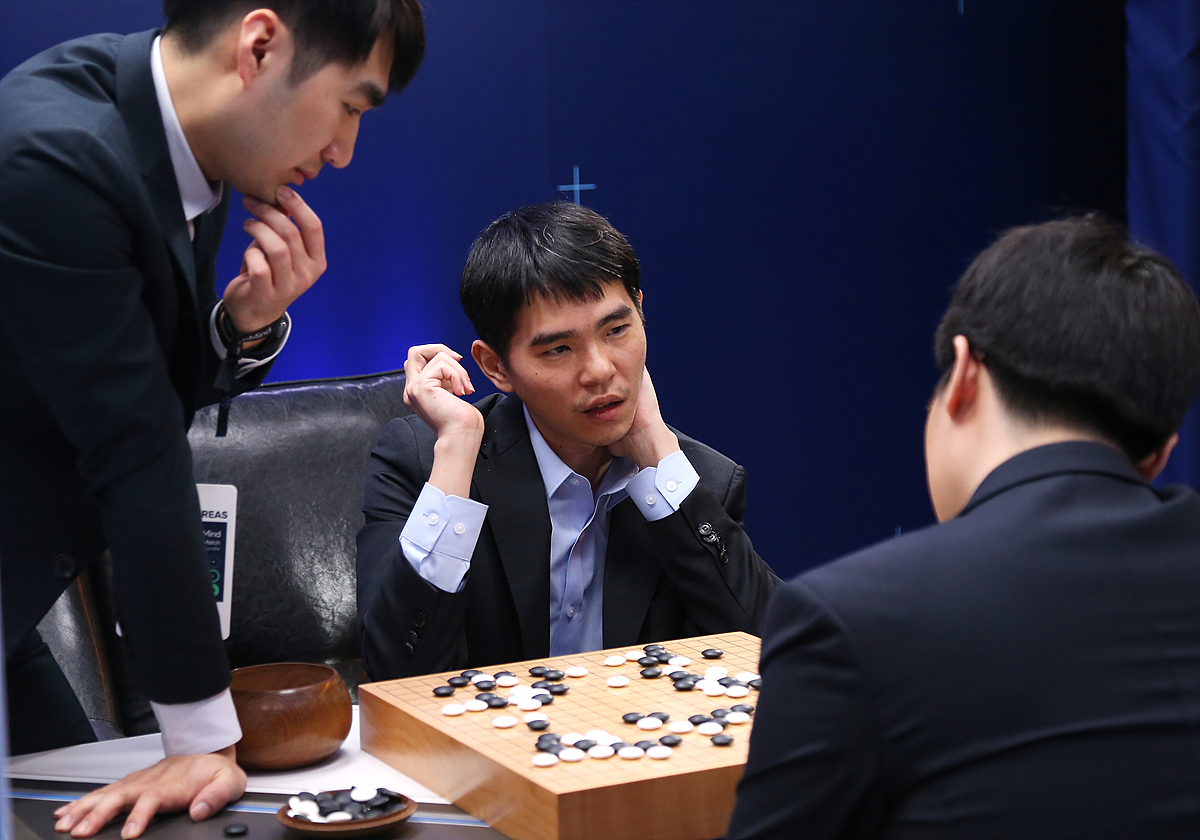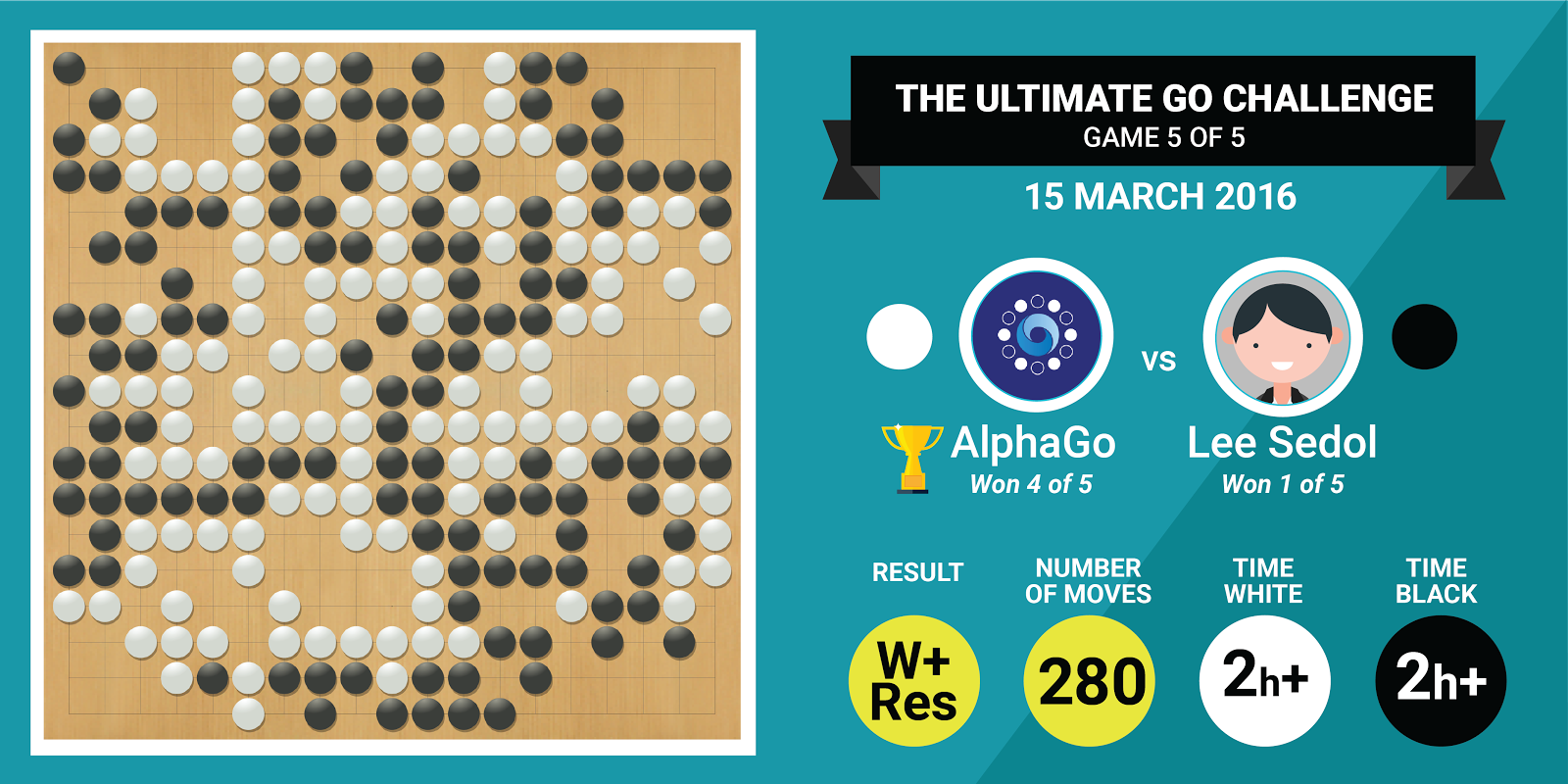
At today’s fifth and final game in the Google DeepMind Challenge Match, the Go-playing computer program, AlphaGo, defeated the best Go player of the last decade, Lee Sedol, in a very close game. Playing as white, AlphaGo won by resignation after 280 moves. Both AlphaGo and Lee used their entire two hours of playtime, and Lee went through two byō-yomi overtime periods.
The game was tight until the very end, with commentators going back and forth about who was in the lead. At the beginning, AlphaGo ceded major territory and “thickness” to Lee but came back strong to eke out a narrow victory on the rest of the board.
With AlphaGo’s victory in the Google DeepMind Challenge Match, Google DeepMind will donate the $1 million USD in prize money to UNICEF, STEM (science, technology, engineering, and math) charities, and Go organizations.
Demis Hassabis, Co-Founder and CEO of DeepMind, said about the entire tournament, “In the past ten days, we have been lucky to witness the incredible culture and excitement surrounding Go. Despite being one of the oldest games in existence, Go this week captured the public’s attention across Asia and the world. We thank the Korea Baduk Association for co-hosting the match, and thank all of you who watched. And of course, we want to express our enormous gratitude towards Lee Sedol, who graciously accepted the challenge and has been an incredible talent to watch in every game. Without him we would not have been able to test the limits of AlphaGo.” He continued, “We wanted to see if we could build a system that could learn to play and beat the best Go players by just providing the games of professional players. We are thrilled to have achieved this milestone, which has been a lifelong dream of mine. Our hope is that in the future we can apply these techniques to other challenges — from instant translation to smartphone assistants to advances in health care.”
Lee Sedol said at the post-game press conference, “I am very sorry that the Google DeepMind Challenge Match is over. Today I wanted to bring the match to a successful conclusion. Personally, I am regretful about the result, but would like to express my gratitude to everyone who supported and encouraged me throughout the match.” In response to a journalist’s question, Lee said, “I have questioned at some points in my life whether I truly enjoy the game of Go, but I admit that I enjoyed all five games against AlphaGo. After my experience with AlphaGo, I have come to question the classical beliefs a little bit, so I have more study to do.”
Michael Redmond, English commentator and 9-dan professional, said, “It was difficult to say at what point AlphaGo was ahead or behind, a close game throughout. AlphaGo made what looked like a mistake with move 48, similar to what happened in Game Four in the middle of the board. After that AlphaGo played very well in the middle of the board, and the game developed into a long, very difficult end game.” Redmond also had thoughts on the future potential of the software, “AlphaGo has the potential to be a huge study tool for us professionals, when it’s available for us to play at home.”
Kim Seongryong, Korean commentator and 9-dan professional, said, “Just like the scientists, Go players are always trying to find new methods and approaches. And we are so happy when we find them. This Challenge Match has brought us Go players to new areas we’ve never explored. We are now seeing a lot more interest in playing Go. And even in one week, I feel like my Go playing has improved.”
Chris Garlock, English commentator and Managing Editor of The American Go E-Journal, said, “This was an amazing match… the drama, the historic aspect, the quality of the games, the brilliance of AlphaGo, the brilliance of Lee Sedol, and then the amount of media coverage. I just want to say thanks to the entire DeepMind AlphaGo team. This is a gift to Go. This is going to do a lot to bring Go to new audiences. We could not have dreamed this up any better, and it delivered beautiful games. This match has done what Go always does: brings people together in friendship and cooperation, and that, like the game itself, is beautiful.”








Leave a Comment